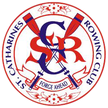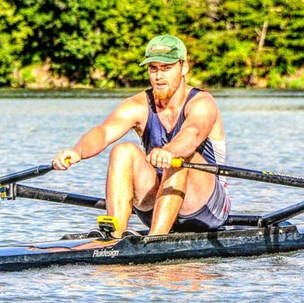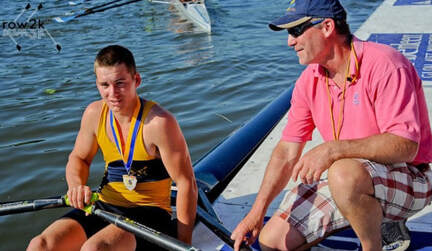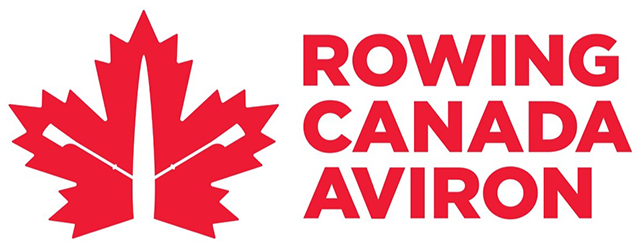|
St. Catharines Rowing Club Presents
LK: Your dad obviously played a huge role in your rowing career, how did that relationship evolve from novice rowing when you were 11 years old, to now? MF: When I was younger, I wasn’t the fittest person. I had played minor football, and I did the summer learn to row program. I didn’t like it all, I much preferred football. Rowing was just a summer activity. My dad made me do it for one year, and then that summer season, I won a race or two, and in grade 10 I started to develop it a bit more. He was my coach all through high school, and he really just built me into who I am today.
it that far, because everyone around me had been sculling for years at that point. I remember I got in the starting gates, on the Schuylkill river, where the first part of the race is on an angle, and once you get through the bridge, maybe 200m into the race, you really learn who’s in the lead at that point. So I had the same strategy: I was at a 38, 40 rate, just ticking along, and I came through the bridge and I was in the lead! So I had to keep building the lead. By about 1000m in, my legs were totally shot. My parents were in the grandstands, and my brother’s supposed to be recording, but he was too excited and forgot to actually start recording. My dad’s not even looking at the course, he’s just beside himself. And then he looks up and sees me in podium contention! When I get to the 1000m I know I have to turn it up, but I can’t really, I’m just exhausted. The lead starts to close, and first place blows past me, second place just beats me, I beat fourth, by like .15, but then right after I crossed the finish line, I flipped! No one cared about the first or second, because they were all so concerned about me. So that was really the start of my sculling career, and kind of how I built my focus on rate in the rowing world, which is kind of how I’ve excelled. But my dad was definitely the building block of my rowing, and then I just had to tweak it on my own. He’s always checking in on me. LK: That Stotes competition must have been such a wild day for you, with the semis in the morning and that final in the afternoon. MF: Oh, yea for sure, plus the drive home that night! And my brother forgot to record the race, and that’s the one race I’d love to see again. Did you ever race in Philly? LK: I raced at Stotes twice in high school, but only once on the Schuylkill, and it totally messes with your head when you’re heading into the bridge. I was closest to one of the bridge abutments, so I truly had no idea where I was at that point in the race. But I suppose that what makes everyone just get out of the gates as quickly as they can, and race with blinders on for the first half. How special was it to have your dad so closely tied to your rowing career, as opposed to the typical parent-athlete style of staying in the grandstands? MF: My parents have been incredible. Rowing, you obviously don’t get much funding, and when I was out west (with the national team), they were personally funding me. When I went to U23’s in Italy the first time, they generously funded me to go to that. And it was such an exciting time, it was a little last minute, and I was just so excited. And at the grandstands in Italy, I was sitting there watching the practices go by, and I hear, “Finley! Matt Finley!” and it’s my mom and dad. They came! They didn’t tell me! They’ve been to Bulgaria, the Netherlands, Peru, everywhere to support me. LK: Given your experiences both with SCRC and Brock University, what does Henley Island mean to you? MF: Well, it’s home. If I go to any other course, it’s just not St. Catharines. I can still just think about calm days in St. Catharines, just chilling in my single. That’s my home course, and I wish I could train there all year long, but unfortunately here, there’s wintertime and when the wind kicks up, you hate that course so much. But when it’s nice weather, and the water’s calm, it’s the best place to be. LK: It is too bad that we can’t row all year round, because the permanent dock is so tempting. Of course we can’t row right now with the lockdown, but in early December I was out on the water with a group and we ran onto some ice! Luckily it was quite thin, so there wasn’t any damage, but that certainly is an advantage for our club to have the option to row all year round. MF: There does get to a point when you’re rowing that it’s so cold and it’s not enjoyable. When I was out west there were days when it didn’t feel helpful to be in the cold. But what’s so nice about here is that there is a whole winter season to do cross training and it just gives you a breath.
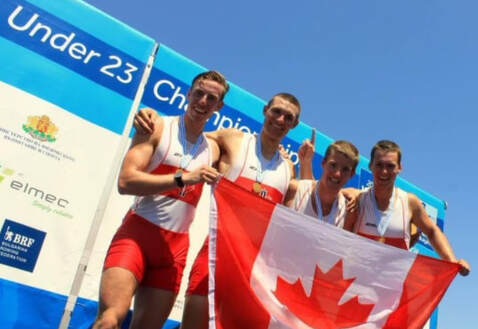 LK: With three U23 World Championships experience, and the gold in the 2015 quad, you were certainly quite successful. I saw on your bio for Brock University that you consider anyone to win a Worlds as your role model. What did that mean to you to join those ranks? MF: It was a huge accomplishment at the time. In 2014, we were inexperienced, and we came 4th in the semi-final, so winning the next year was really exciting. But in regards to role models, it’s always cool to see Canada excel. When we won, it honestly just felt like a job well done and I think the more you race, the more it’s kind of the same. If I were to race for SCRC in the single, or for Canada in the single, it’s still the same race. You have the same process and intention. But, I don’t know, if what I’ve done inspires people to be better, to be active, then that’s great. LK: Well speaking of inspiring people, could you talk about your recent 100k erg you completed for your friend, Nick? MF: The idea for that kind of came from my new interest in running, that was really forced by the pandemic. I had done a few marathons, a few half marathons, and then I had the crazy idea to do a 100k run, so I ran from the Service Road, all the way to Toronto. My right knee was really acting up in the last 5k, so I had to walk a bit of the last 5k, but I did it. So that was my big accomplishment for running, and then shortly after, my buddy unfortunately had a stroke. We went to primary school together, and I wanted to do something to help him recover faster. So when thinking of what to do a fundraiser for him. I wasn’t going to run again, but I realized that the erg was the next goal. So I got permission from his family to do a 100k erg, and I didn’t really train for the piece, the longest I had been on the erg for recently was about 30k, and before that all I had been doing was short pieces. So we broadcasted the piece on Facebook and Instagram, my mom was my little nutritionist, she kept bringing me fruit. We had a lot of people come over, cheering me on, spraying water on me! But the goal was just to raise money for him, and he’s recovering extremely fast! I always post updates about him, he took a swing at a golf club the other day, and he’s making a quicker recovery than most expected. It was just something I could do to help a friend out. LK: It’s such an incredible thing to do, especially for a friend. We’ll attach the link to the GoFundMe to this article in the event that anyone wishes to donate. Between that erg, and the 100k run you did earlier that month, what motivates you to complete these extreme athlete challenges, and how do they compare to a typical rowing event? What did you do to occupy your mind in the middle of those long pieces? MF: They were definitely some dark times in the middle of those pieces. When I was doing the erg, we had some movies playing, but after a while, I lost interest in that and watched some Olympic races, and then in the final 10k, I had a bunch of buddies over and that got me through it. But when I was 60k in, that was pretty dark. Interestingly, that was the same spot that was the toughest in both the run and the erg. 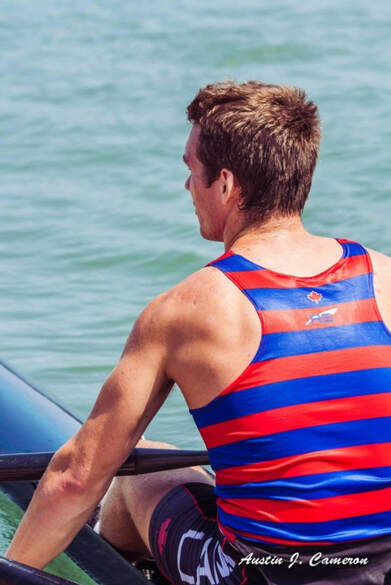 LK: What did you prefer, the run or the erg? MF: Mentally, the erg messed me up more. Physically the run was more difficult, and probably because I didn’t really train for the run. The longest I had run before that was 42k, which was triggered off of people telling me I couldn’t run 100k. And I was just motivated to prove them wrong! But the erg was mentally much tougher. Although physically, I think I was just so used to the form, and rowing stroke, that it didn’t bother me as much, I’ve just up and down that slide so many times. But I did, unexpectedly get these blood blisters under the nails but they didn’t really come in until after I finished the piece. The hydration was also pretty tough to get through. LK: Is there anything else, other than proving nay-sayers wrong, that motivates you to complete these ultra athletic events? MF: It’s also to prove to myself that I can do it, but being a bit removed from the rowing world, I just want to keep doing things that excite me. The first day of quarantine last year, I did my first marathon, when before that I had only ever done 14k at the most. But after that, I just kept wanting to beat my times. And just looking at people excelling online, that’s also very motivating. LK: Do you see yourself going back on the water soon, once the lockdown is over? MF: Oh yea! If there’s a racing season this summer, coming up, I’ll definitely be out there. I haven’t done much on the erg recently in terms of shorter distances, lots of low rates. I’ll do 500m at a 20, and see how that goes. Or a 2k at a 20, and then a 2k at a 30 and compare them. But I do feel like I’m in the best cardio and strength shape I’ve ever been at. But I’m just excited to see what I can do. LK: What lessons have you learned from rowing that you have carried into other areas of your life? MF: Teamwork, for sure. I try to show up on time the best I can; work ethic. Sometimes I’ll be doing labour jobs, and when other people are tired, or want to stop, I just keep going. But definitely teamwork and believing in your team. The time management, I’m still working on, but work ethic, and believing in the people around you is something rowing instilled me. AuthorLauren Kelly is a junior at the University of Notre Dame, where she competes on the rowing team and majors in history and Irish studies. A long time member of the St. Catharines Rowing Club, she recently stepped into the role of social media coordinator for the club. |
St. Catharines Rowing ClubThe St. Catharines Rowing Club has a long tradition of competing at the highest level in the sport of rowing. Categories
All
Archives
November 2023
|
Please Support Our Sponsors
SIGNATURE
PLATINUM
GOLD
SILVER
BRONZE
© 2014, St. Catharines Rowing Club
St. Catharines Rowing Club, P.O. Box 28010, 600 Ontario St., St. Catharines, ON, L2N 7P8.
St. Catharines Rowing Club, P.O. Box 28010, 600 Ontario St., St. Catharines, ON, L2N 7P8.
